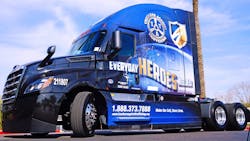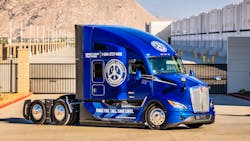Meet Liz Williamson. Entered into the sex trafficking trade at age 6 by her mother, Williamson grew up believing that her voice did not matter. She believed that it was normal to be sold, to be abused, to take your clothes off after men handed her mother money. Williamson was raised living a double life—Catholic school and ballet class by day and being trafficked at hotels, motels, truck stops, and the back of restaurants by night. Now, after escaping 11 years ago, Williamson is using her voice to raise awareness, tell her story, and share how others can help prevent others from experiencing her past.
With the help of Truckers Against Trafficking (TAT), a nonprofit organization that exists to educate members of the transportation industry to combat human trafficking, and American Trucking Associations (ATA), Williamson was joined by Antoine Sadler, a professional driver for Walmart Transportation and board member of TAT, and Kendis Paris, executive director of TAT, in an ATA webinar to share what to look for and how the trucking community can help combat trafficking.
“It's a privilege to be a survivor,” Williamson said. “Because there are people who haven't survived, and I sit with that weighty knowledge. And that's why an event like this today is so important. Human trafficking, it's truly a crime that involves power and greed and control. But I'm happy to say I want to end this on a positive note. Even though no one saw me as a child, and maybe no one saw me as an adult, I get to be the hero. Now, I get to say that recognition of the survivor matters, and I'll use my voice in whatever capacity I can.”
How TAT has shifted the conversation
Sadler, a longtime supporter of TAT’s mission, spoke to the transition of being just a driver to being an advocate.
“Unfortunately, it's a sad reality,” Sadler said. “From a driver's perspective back when I first joined TAT in 2016, I felt this was just a choice that a lot of people were making. Once you get the understanding, you get the training, you understand that these people are forced into this way of life due to whatever circumstances that it comes from.”
Paris explained that TAT was born by trying to find the source of who can be the most helpful in the fight against trafficking.
“First, we asked who is out there in terms of the right place at the right time,” Paris said. “Who is a group of people, a segment of the population, that if they understood this crime, if they understood what they were looking at, and were activated, they could make a difference. Who really could actively discover and disrupt human trafficking networks and, and this is where my family and I began Truckers Against Trafficking.
See also: How vigilant truckers can disrupt 'modern-day slavery'
“Over the last decade, a cultural shift is occurring between our drivers, like Antoine, who are saying, ‘Wow, I just probably never really even thought about it. Or if I did think about it, I thought one way,’” Paris explained. “And now they're saying, ‘I have daughters, I have granddaughters. How can I be a trucker against trafficking?’ So this is what it's all about, and it's been phenomenal to see professional drivers' eyes be opened, and then make a huge difference out there on the roads.”
Elisabeth Barna, EVP of industry affairs at ATA, shared a specific example of this cultural shift seen right in the trucking industry—through the America’s Road Team.
“We get a number of drivers that apply for the America’s Road Team,” Barna said. “And I remember about six years ago, a driver came in for their speech—it was on safety training against human trafficking—and the driver said, ‘I was sitting in my cab, and around midnight, there was a knock on my door. I rolled down my window and said I’m not interested, get away.’ The driver said that it haunts him every night, knowing that he could have made that difference. And each year, I hear a story like that from other drivers, except now these stories are ‘I let them up in the cab. I protect them and make that phone call.’”
A victim-centered approach
Barna’s story is a prime example of a victim-centered approach. Thinking of who the victim might be—their daughter, niece, some little girl or boy, or even a grown adult—and how they would want someone so close and dear to their family treated if they have experienced some horrible violation. According to Williamson, who was saved by an off-the-clock bus driver, all answers should be with the utmost respect and dignity, because victims have felt like they have no dignity.
“For me, it was being offered a sandwich from a bus driver,” Williamson explained. “He was off-duty, and just happened to drive by the bus stop where I ran to in the rain with no shoes. I remember that it was a horrible sandwich because it had olives on it, and I hate olives, but it was the best sandwich in the world because out of the kindness of his heart, he saw me as a human being. Yes, I was poorly dressed. I had no shoes on, and I had no way to pay for that bus fare. But he saw me as someone who needed help and needed dignity.
“And he said, ‘Are you hungry?’” Williamson continued. “I was scared to say yes, but at the same time, I was so hungry, but I was hungry for more than that sandwich. I was hungry for someone to see me. And that's what he gave me. So it wasn't something magical. He didn't have the right words, but he knew this person shouldn't really want to sit out in the rain. That might sound so simple, and that it's too simple to be good. It's too simple to be true, but he just treated me like a human being who didn't have to take their clothes off to prove that they were worthy of value. And that's what really changed it for me because that was the first man that looked at me like I mattered without me having to do something for them to prove that.”
Williamson urged truck drivers to always keep their eyes open, especially at truck stops. "Sometimes, a girl will enter a truck wearing a red shirt and leave the truck wearing a different shirt or a sweater because the first shirt got soiled after being violated," Williamson said. "If someone sees a sudden change in wardrobe, there's a good chance they need help and need someone to make the call for help that they aren't able to make."
Williamson also suggested that drivers keep extra bottles of water or granola bars in their cabs because “you don’t know the last time someone ate and you don't know the last time they were allowed to take a drink of water.”
“Traffickers can be so controlling that they say, ‘You don’t deserve any water, so I’m not giving you any,’” Williamson explained. “I still sleep with a water bottle next to my bed, and I’ve been out for 11 years. I always chuckle when I see olives in the grocery store, because it makes me think about that sandwich. And it makes me think about a bus driver named Paul, who may not even know that he made such a huge difference.”
Actions, not words
Partnering with organizations like TAT is the “bread and butter to combating trafficking,” Paris explained.
“When you consider every tier of the industry: CDL schools, carriers, the truck stop industry, the associations, brokers, OEMs, and 3PLs as well as public agencies,” Paris said. “Every single sector in the industry can make a difference and has a role to play, which is why we partner with attorneys general and why we train law enforcement. You don't want a professional driver to make a phone call, and then the cop show up and arrest a 15-year-old as a child prostitute—there is no such thing as a child prostitute—and yet it still happens. It's imperative that we're training law enforcement and also training highway patrol in interdiction stops to be looking out if there's a passenger in the vehicle and not just looking for drug trafficking, but also be on the look out for a potential human trafficking situation.”
Landstar System, a transportation solutions provider based in Jacksonville, Florida, and a corporate sponsor of TAT, recognizes that truckers are one of the first lines of defense to identify, report on, and help prevent human trafficking. Orientation for all new BCOs at Landstar includes information on human trafficking, and the company has worked with the organization to educate and certify over 2,500 of our BCOs and employees on the proper actions when encountering potential trafficked victims.
In addition to its company policy, Landstar has signed the U.S. Department of Transportation’s Transportation Leaders Against Human Trafficking (TLAHT) pledge that calls on leaders in the transportation industry to commit to employee education, raising public awareness and measuring the collective impact to end human trafficking.
On Jan. 12, 2022, the Florida Office of the Attorney General launched a new initiative called You Can Stop HT to end human trafficking through workforce training in Florida. Landstar Field Safety Manager Theresa Broadbent represented Landstar at the official press conference launching the initiative in Tallahassee, Florida.
XPO Logistics, a provider of freight transportation services based in Greenwich, Connecticut, has renewed its platinum partnership with TAT for 2022, continuing to provide Truckers Against Trafficking training materials to company drivers across its transportation operations in the U.S. and Canada.
“The transportation industry is in a unique position to help prevent modern-day human trafficking through education,” said LaQuenta Jacobs, XPO’s chief diversity officer. “XPO is proud to stand with TAT in raising driver awareness.”
This is just a snapshot of many companies and organizations within the trucking community that have joined forces to fight human trafficking. According to Sadler, it takes a village.
The trucking industry “can fight this in numbers,” Sadler said. “It takes one individual to get started. Reach one, teach one. The more you get involved, the bigger the army gets, the more we can stop this. I tell people about the fertile soil analogy. Everybody always tries to equate human trafficking with somewhere else, somewhere different, another country, another area. But if the soil is fertile, it's going to grow. But if everyone was involved in the fight against human trafficking, if everybody took the initiative to say, ‘I'm not going to do this anymore, I'm not going to be a part of this, and I'm going to be a part of what's gonna stop it, this will stop. It has no choice, it will not grow.”
What trucking can do
According to Paris, the first step to education starts with the driver.
“Make this part of your regular training and orientation,” Paris said. “Use your sphere of influence in order to get this information in front of them and say, ‘Hey, I just attended an ATA webinar about human trafficking, do you know that there's an organization called TAT where you can train your drivers to be the eyes and ears of our nation's highways through their free training? That's a great starting point for anybody.”
But for Sadler, that sphere includes more than just the driver. “You just can't stop with the drivers,” Sadler said. “You go to the CEOs, managers, and safety managers, and if they get the word out just as well as the drivers out here performing, they can be that sort of a coach to the team. Like Walmart, they can put the TAT stickers on the side of the truck and have TAT wallet cards to pass out inside their office. If they see that their team is open and ready to go, then your next team, drivers, dispatchers, vendors, anybody that gets involved will be on board.”
Paris noted that being an advocate can start at the beginning. “OEMs put TAT’s information in actual tractors that they're manufacturing, so outfitting your tractors on either the driver or the passenger side window with one of our TAT decals can be a huge help.
“We just completed a survey of over 13,000 professional drivers. Just about 10,000 of them said that, still, the No. 1 way they are solicited for sex is a knock on the door. So think about how many eyes are on those stickers and your company truck. And in the window, it says, ‘Do you need help?’ And it's got the hotline number front and center for your driver as well,” Paris continued. “In addition to adopting anti-trafficking policies, companies should emphasize that employees cannot use company work time and cannot use company work product to purchase commercial sex. Because if we do not address the demand for commercial sex, we're never going to really combat human and sex trafficking.”
Williamson, who so bravely shared her survival story with the world, urged those in attendance not to let the advocacy end with ATA's webinar.
“Don't let this just be a webinar you attended because you saw it and it sounded interesting,” Williamson said. “Make some kind of impact with this. Whether that's a donation to TAT or committing to get your driver's trained, or talking with your family, do something more than just attending the webinar, because that's how we're really going to make an impact.”
If you suspect trafficking is taking place or have an emergency, please call local law enforcement or the National Human Trafficking Hotline immediately at 1-888-373-7888 to report what you know.
About the Author
Catharine Conway
Digital Editor
Catharine Conway is a past FleetOwner digital editor who wrote for the publication from 2018 to 2022.


